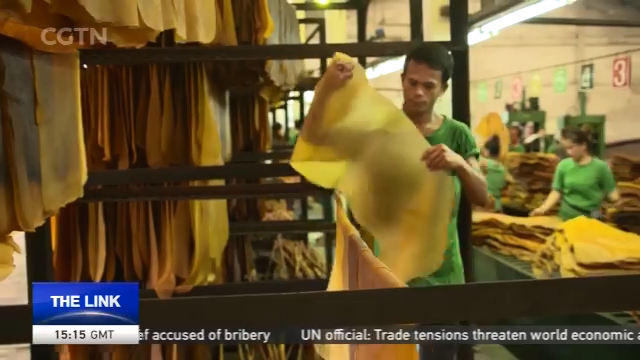
08:13, 10-Oct-2018
The Trouble with Tariffs: US tariffs on Chinese automobiles hurting Thai rubber industry
Updated
07:37, 13-Oct-2018
02:31

South-East Asia is fearing that a prolonged stalemate over trade talks could lead to an all-out trade war and that uncertainty is causing commodity prices to fall. And for Thai rubber farmers, as CGTN's Tony Cheng explains, the drop could be disastrous.
Scraping for a living, but barely even doing that. A rubber tapper scores the bark, creating a channel for white sap, pure latex to drip from the tree into a waiting bowl.
This slow and patient process is a pillar of the Thai economy, the number one producer of rubber in the world.
But times are tough, prices are a third of what they were 5 years ago and could be about to drop even further.
PICHAI CHASAWAT THAI HUA FACTORY MANAGER, RAYONG "There won't be any rubber tappers, they will quit because the wage is not worth it as the prices keep decreasing dramatically. Even now it's very difficult to find rubber tappers to do the job."
The sheets are cleaned in huge baths, before being hung on racks to be dried.
They're then stacked in huge ovens and baked at 60 degrees to leave only the purest rubber.
75% of the world's rubber is used in the automotive industry and one country is seeing it's the motor trade grow far more than anywhere else.
TONY CHENG RAYONG, THAILAND "These rubber sheets are being sorted by quality, the highest grade which will be used in plane tires and even racing cars, but in this factory, which produces fifteen thousand tons a year, 60% is exported to China and only 5% to the United States"
US tariffs have targeted Chinas automobile industry, the main buyer of Thai rubber. Thai producers are very concerned now Chinese manufacturers are being squeezed, they will suffer too.
KORAKOD KITTIPOL ASSISTANT EXECUTIVE VICE PRESIDENT, THAI HUA RUBBER "If you want to survive with your business, and the main market of your business is the USA, it means you need to move and change your strategy."
In the warehouse a stark illustration, the small pile at the front for a tire manufacturer in the US, the middle pile for domestic use, then the stacks at the back destined for China.
If US tariffs force Thailand to choose which way to go, the decision is already made.
Tony Cheng, CGTN, Rayong Thailand.

SITEMAP
Copyright © 2018 CGTN. Beijing ICP prepared NO.16065310-3
Copyright © 2018 CGTN. Beijing ICP prepared NO.16065310-3